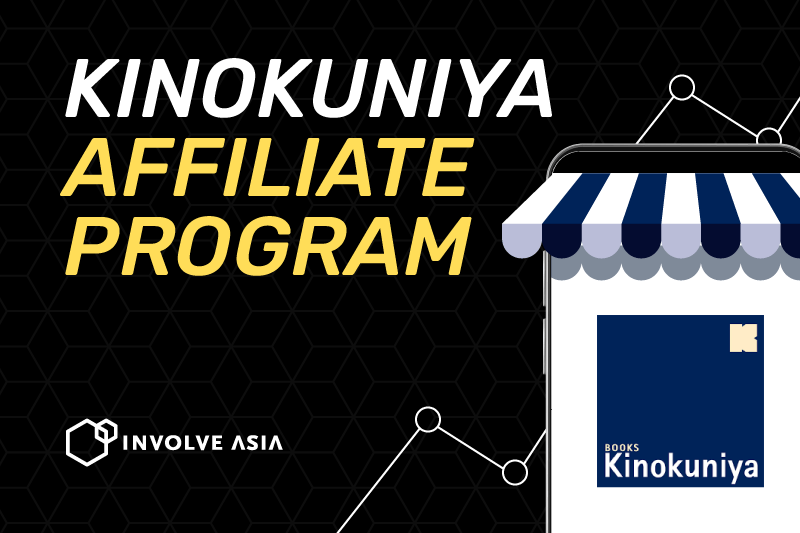We explore how affiliate marketing has been used as one of the effective strategies in promoting cybersecurity products & services since the rise of ensuring data privacy whilst being in hybrid working during and post-pandemic.
The following trends we looked into are based on the overall performance of the cybersecurity industry while referring to our key performance indicators (conversions, sales & revenue) across the world, focusing on the type of Partners promoting its products and services.
- The rise of remote security for cloud services
- Consumer behaviour
- Search trends for cybersecurity
- Content-driven awareness for cybersecurity
- Influencers’ impact on purchase decision-making
- Future of cybersecurity with innovation
Click on the following drop-down bars to view more in each report section.
Cybersecurity Industry Outlook
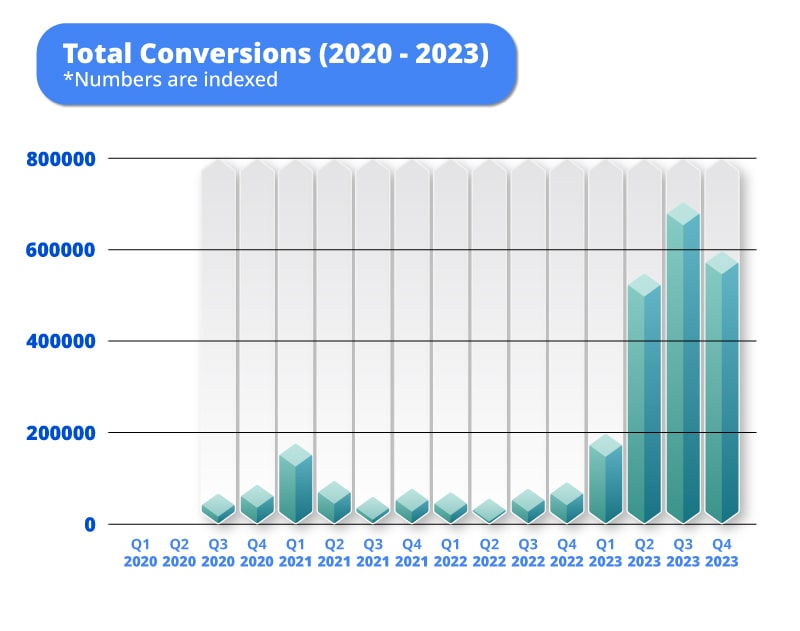
Successful purchases of cybersecurity products & services recommended by Involve Partners impact higher sales in Q2 2023 and Q3 2023. Total conversions increased by 3x throughout the three quarters of 2023.
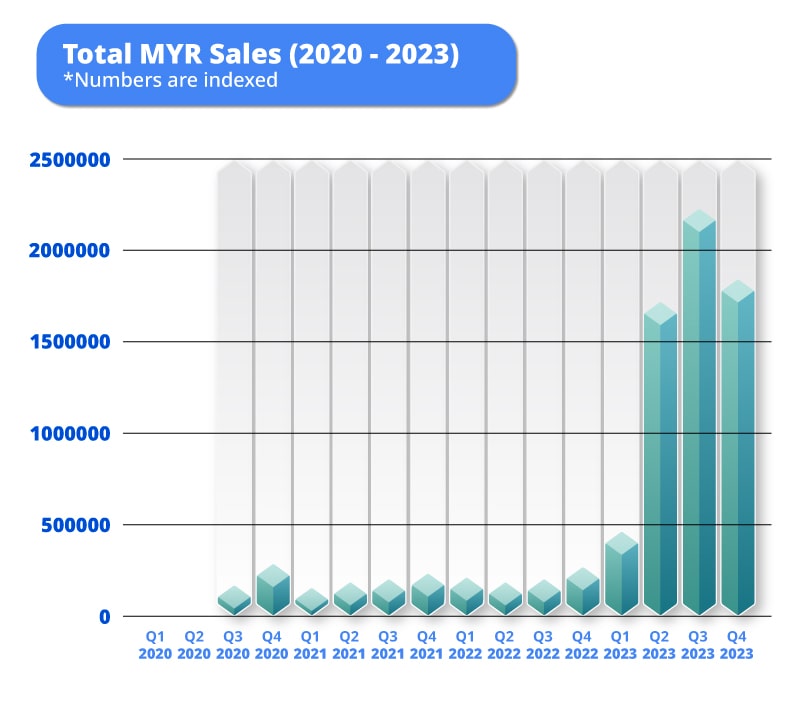
Involve Partners contributed the most sales for cybersecurity brands in 2023, with a 4.8x increase.
The massive growth in conversions and sales in 2023 is due to the adoption of cybersecurity products & services that helped individuals and businesses keep their data protected, especially when working remotely.
Various governments collaborated on more global initiatives and collaborations for Cyber Security Awareness Month in October 2023 to raise awareness about digital security and empower individuals and businesses to protect personal data from different forms of crime online.
Businesses and individual professionals are offered the following free & accessible resources to help them take action and develop critical cybersecurity skills:
- Articles & guides
- Posters & banners
- Trainings & webinars
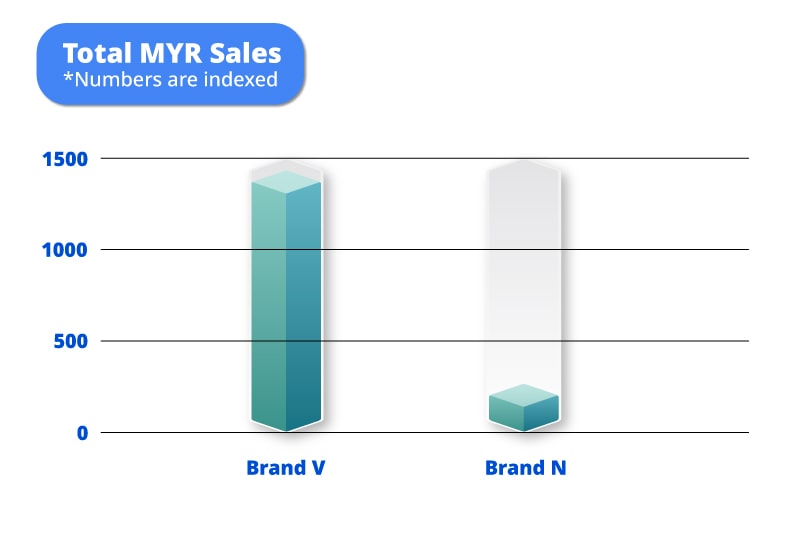
Involve Partners focused more on promoting VPN services to their followers for better conversions & sales based on type of customers and products made through their affiliate links.
They promoted Brand V more than Brand N because of:
- Better products at affordable prices and limited-time deals
- Detailed information with creative banners & promo codes for evergreen & tactical campaigns
- Available promotional methods with terms & conditions
Brand V earns 10.8x sales more than Brand N for their wide range of monthly & yearly plans.
The Rise of Remote Security for Cloud Services

The pandemic hit the fast-paced working environment, which led many employees to work remotely, where they could fulfill their daily tasks anywhere with an Internet connection.
At the beginning of 2022, the adoption of hybrid work increased from 13% to 25% within three months as they felt productive and enjoyed a work-life balance.
According to Forbes, in 2023, 12.7% of full-time employees will work from home, while 28.2% will work a hybrid model, which offers them work flexibility and maintaining a physical presence at the workplace.
However, the rise of cyber threats (such as phishing scams, malware, and other malicious activities) targets remote workers with weaker network security.
Therefore, most companies increase and protect the remote & hybrid work experience by providing efficient security solutions for employees who will be able to access corporate data and applications from various locations and devices safely.
Based on a study from Tanium, in 2020, there was a 90% increase in cyberattacks towards remote working employees, with 98% of respondents seeing a rise in security challenges within the first two months of the working-from-home period. This led 70% of respondents to increase their focus on improving cybersecurity for remote work.
Companies with IT experts seek cost-efficient and long-term cybersecurity solutions, including web hosting, antivirus, and VPN services, that provide remote protection against cyberattacks.
To meet the rising need for cybersecurity at remote workplaces, cybersecurity brands must understand the customers’ experiences and need to have their data secured, which we will explain further in the next section.
Remote Individuals’ Preferences and Behaviour
According to SimilarWeb, based on the top 100 websites in the Cybersecurity industry, 50:50 of monthly visitors browse through the websites on mobile and desktop.

Also, Direct and Organic Search contributed the most shares in traffic across Southeast Asia.

Customers aged between 18 and 34 years old researched more than 6 websites based on other people’s recommendations before deciding to visit and purchase products & services on 1 reliable website.
Security Magazine reported that brand reputation (41%) is the main factor in purchasing cyber security products, followed by cost, expertise, and third-party referrals. However, 68% of buyers are overwhelmed by the sheer number of cybersecurity vendors, while 38% said cybersecurity vendors need more brand awareness.
Buyers consider buying cybersecurity products due to cyber attacks that affect data loss, revenue, and reputation.
Furthermore, customers look for the latest cybersecurity updates through cyber, tech and business publications, industry events & conferences, and thought leadership from cybersecurity experts, including case studies and white papers.
According to Mindflow, customers take in the following factors when purchasing cybersecurity tools for their remote work:
- Quality of API – creating workflow and automating processes involving multiple security tools
- User Experience – usability and understanding the use of cybersecurity tool that saves time & resources
- Scalability – ability to adapt to the changing needs of individuals and/or organisations
- Best-of-breed – specialised functionality based on specific needs and/or industries
- Compliance – trust and credibility in handling & storing data based on regulations
- Support – direct support through platform and customer service to ensure the cybersecurity tool is maintained and updated
Currently, customers are looking for the following tools which they consider to purchase as long-term investments in protecting their data from cyber threats:
- Network Firewall
- Application Firewall
- Anti-virus Software
- Ransomware
- Phishing
Customers seek accessibility in finding credible cybersecurity tools that efficiently and effectively protect privacy anytime and anywhere.
So, cybersecurity brands must identify the pain points to provide updated features and catering benefits at affordable prices in the long run.
Let’s look at what customers want when purchasing cybersecurity products and services.
Search Trends for Cybersecurity
According to Atlas VPN report, interest in searching for ‘cybersecurity’ increased to an all-time high for the past decade, from 2011 to 2021, as more cyberattacks significantly impact individuals and organisations.
Singapore has the highest interest in cybersecurity, followed by Saint Helena and the United States.
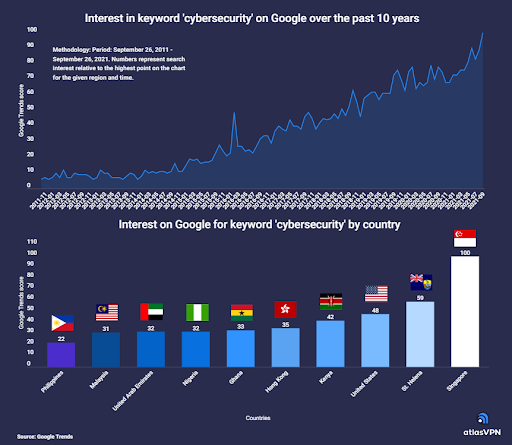
Online users are becoming more aware of privacy and how to protect themselves from cyberattacks using security tools.
While the terms ‘antivirus’ and ‘keylogger’ have been declining over the past 15 years in the cybersecurity market, online users have been searching for the following keywords for research before purchasing security tools:
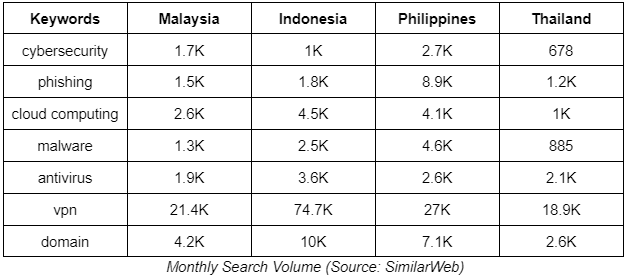
As the search trends for cybersecurity significantly garner monthly volumes, cybersecurity brands are utilising SEO strategy by inputting the most searched keywords on their website and digital marketing assets to increase visibility on popular search engines.
Cybersecurity brands avoid using Google Ads as many hackers exploit the search engine’s advertising platform to run phishing activities and spread malicious software, leading to potential risks to online users.
Some websites may be compromised by affecting the site’s content without the owner’s knowledge, leading to misinformation on ads and websites.
Beyond search, online users rely on the credibility of content creators and influencers sharing their reviews on cybersecurity tools, which we explain further in the following section.
Creating Cybersecurity Awareness with Edutainment Content
In today’s digital world, individual professionals and businesses are providing accessible resources about cybersecurity to protect themselves, customers, and stakeholders from cyber incidents.
According to the CybSafe study, researchers discovered the results of 60 participants (25 – 45 years old) answering general cybersecurity knowledge questions:
- More than 50% of participants put the correct answers for identifying fake emails, spotting secure passwords, and identifying when to report security incidents
- Only 40% of participants select the correct answers for multi-factor authentication questions
- Only 13% of participants answered correctly on selecting the most important characteristics when creating a password
Thus, insightful information about cybersecurity needs to be understandable & engaging with less jargon to fill the knowledge gaps.
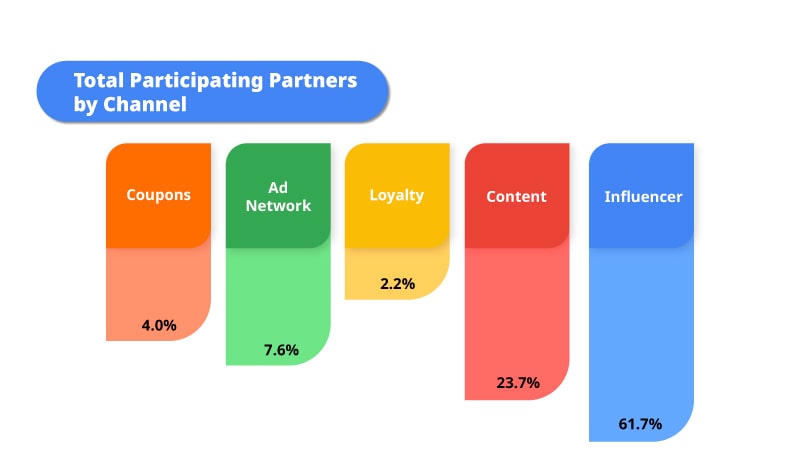
84% of participating Involve Partners (Influencers and Content Creators) dominated the most in bringing sales & revenue by sharing cybersecurity content with their audience on their social platforms.
Affiliate partners will have more long-term relationships with cybersecurity brands due to the efficiency and credibility of providing comprehensive knowledge with risk-free products & exclusive deals to their followers.
YouTube channels are one of the most resourceful platforms where viewers get insightful information & guidance about cybersecurity from niche content creators.
On the other hand, some cybersecurity brands reach out to potential YouTube content creators and sponsor them by featuring them in the videos.
The top three VPN services sponsor recognisable YouTube content creators who share the same values of privacy and data protection and are constantly on the go in making videos at different locations.
The Future of Cybersecurity with Innovation

As the adoption of hybrid work among individuals and companies continues to increase, cybersecurity brands rely on resources & technology to identify enormous amounts of data related to suspicious activities and protect against cyber threats.
AI and machine learning are becoming increasingly reassuring to help automation of information security that saves time and money on handling heavy workloads on data protection and privacy.
According to the Accenture Report, 89% of cyber transformers rely heavily on automation, which is one of the main reasons that enable them to excel at integrating cybersecurity and risk management.
Meanwhile, companies and cybersecurity brands are expanding their talent pool by hiring specialists with knowledge and experience in the cybersecurity field, from data analytics to machine learning.
The World Economic Forum (WEF) 2021 report stated a gap of two million in the Asia Pacific region. Producing specialised programmes in digital and cybersecurity at tech universities will potentially bring talented graduates into the cybersecurity industry and other industries that require long-term solid data protection.
Technology and human talent are necessities to be side-by-side in combating advanced cyber attacks and providing solutions & guidance that increase accessibility in knowing the spectrum of cybersecurity.
Therefore, to further increase growth in affiliate programs, brands should allocate budget for technology that enables them to connect with potential affiliate partners, provide accessible information related to cybersecurity, track affiliate performance across devices, and validate conversions & payments efficiently.
We hope this report helps you better understand how affiliate marketing helps cybersecurity brands increase their growth based on audiences’ preferences and trends.
Looking to expand your brand awareness to target audiences in the cybersecurity market?
Contact our Account Manager or Programme Manager for more details.




